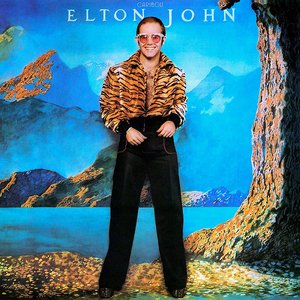Published on Jul 6, 2004
Let’s face it, we all have off days. Musicians are no exception.
The only problem with that is their off days usually result in poor
music. Case in point;
Caribou.
In 1974, Elton John was riding high. His previous three albums
had reached number one in the States. The latter of those three,
Goodbye Yellow Brick Road, was the most successful album of
1973, spawning 4 top ten singles. Everything he touched turned to
gold. This was the scene during which Elton retreated to the
Caribou Ranch to begin the recording of his next album.
I like to be able to describe albums in one word. Simplistic
yes, but it’s effective and it means I don’t have type as much.
Caribou is an “uninspired” album. This is not surprising,
seeing as how the band only had five days available, but it is
disappointing. On previous albums, Elton had maintained a certain
standard of excellence. This is not the scenario on
Caribou. The album was hastily done, and mostly assembled in
post-production. Gus Dudgeon would win the Grammy for the Producer
of the Year for
Caribou and it is easy to understand why. “Don’t Let the Sun
Go Down On Me” greatly benefits from the backing vocals placed in
after the song was finished. Less successful are the horns placed
throughout the various songs, as in “You’re So Static.” However, I
give Dudgeon a pass on that seeing as he was trying to do something
different with the Elton sound.
Caribou would not have been unlistenable without his work,
but it would certainly have been a huge step down for Elton
John.
There are all sorts of reasons why
Caribou is lackluster, but there is one simple explanation.
The songs just aren’t that good. Oh sure, there are some shining
moments. “The Bitch is Back,” “Don’t Let The Sun Go Down On Me,”
and “Ticking” are three very good songs, and I’ll come back to them
later. However, those three make up less than a third of the total
song count, and even the presence of those classics can’t save
Caribou. Ever heard of ” Pinky,” or “Grimsby,” or “I’ve Seen
The Saucers?” Here, think about it for a few
minutes……No? I thought so. Those three songs are from
Caribou, each one as sloppy and clichéd as the other.
One song on the album, “Solar Prestige A Gammon” consists of made
up words, supposedly written in homage of The Beatles’ “Sun King.”
It’s a good thing Elton was such a popular artist at the time;
songs like these would have destroyed the careers of many other
artists.
When it comes to discussing the lyrics of an Elton John song,
Bernie Taupin’s name always will come up, seeing as he has written
the great majority of Elton’s lyrics over the years. When Taupin is
good, he is very good. “Rocket Man,” “Tiny Dancer,” “Mona Lisas And
Mad Hatters” — these are songs that have stood the test of time.
However, on the downside, Taupin has written some god-awful lyrics.
“Grimsby” is a song written in honor of the English city. “Pinky”
is pure sap, with man and his wife sitting in bed on a cold
morning, enjoying a picturesque breakfast moment. There is even a
song titled “Stinker” which is quite ironic. I’ll leave why that is
for you, the reader, to figure out.
Despite all this, the album is not without a few gems. Those
songs are the three previously mentioned, “Bitch…” “Don’t
Let The Sun….” and “Ticking.” The latter is a powerful tale
of a young student driven to murder. The lyrics bring images of
Columbine to mind, giving the song an emotional impact decades
after it’s recording. This is one my personal favorite Elton tunes
for two reasons. One, I enjoy the darker tone not seen often in
Elton’s work, and two, the recording. Too often Elton’s song are
garnished with orchestral arrangements, or other unnecessary
instrumentation. On “Ticking”, we get to just hear Elton and his
piano. This is easily one of Elton’s most powerful songs. “Bitch”
is the sequel of sorts to “Saturday Night’s Alright For Fighting.”
There is some blistering guitar work from Davey Johnstone, and at
the end, there’s even a sax solo and some interjections from the
Tower of Power horn section. Finally, “Don’t Let The Sun…”
is poignant ballad, featuring some very good Taupin imagery. The
hooks in the chorus bring you in, and the song doesn’t let go.
There was one and one only factor as to
Caribou‘s success. In 1974, Elton was one of the biggest, if
not the biggest, rock stars in America and Britain. If there was a
time to come out with a lousy album, this was the right time.
